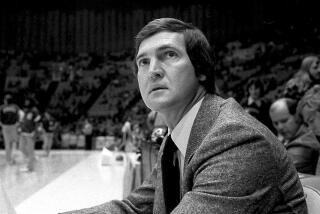New Laker Video Raps Drug Use
- Share via
The figures on the screen are as familiar as your next-door neighbor. We all know them.
Or do we?
Watching the Lakers rap on their new video, you get the feeling you are meeting them, really meeting them, for the first time.
Here is James Worthy, talking not about his diving play in last spring’s NBA title-clinching game but about several close college buddies who went for a drive with a drunken friend behind the wheel and wound up wrapped around a tree.
“Until it touches home,” Worthy says, “you don’t think about alcoholism. It has no effect on you.”
Here is Byron Scott, talking not about his long-range jumpers but about a brother addicted to drugs.
“He used them for seven years,” Scott says. “That’s seven years of his life he’ll never get back. The only thing that saved me was that I had a friend in high school who protected me because I was a big athlete. People would come up to us and my friend would say, ‘Byron doesn’t do drugs.’ ”
Here is Kurt Rambis, talking not about grabbing a critical rebound but about rebounding from life’s difficulties.
“Life’s not perfect,” he says. “There are no guarantees. Everybody’s going to have problems. But most people are going to find they can get through life better by themselves than to let something else run them.”
The messages are not new. Neither is the method. Athletes have been engaged as foot soldiers in the war on drugs and alcohol for some time, delivering anti-addiction messages via the electronic medium, the printed word and to live audiences large and small.
Team videos are certainly not unique. Everybody from the Chicago Bears to the Raiders has shuffled across a studio stage, usually promoting nothing more than a personal quest for greater glory.
But now the Lakers are combining the two in an assault on drug and alcohol addiction unprecedented in sports. It’s Showtime with a message. They have produced two videos and a record on the subject, and Saturday, they staged an anti-drug-abuse rally and walkathon at the Forum and along surrounding Inglewood streets.
One video intersperses action shots with the team singing a rap song, “Just Say No to Drugs,” written by Worthy’s wife Angela and several others.
The second video, titled “The Winning Choice,” is even more innovative. It features Worthy, Scott and Rambis sitting around trading life experiences with a group of young adults--some reformed drug and alcohol users, some non-users.
One of the users talked about the effect of the drug-related deaths of the famous, like basketball star Len Bias. The basic effect: none.
“It doesn’t stop you,” the user says. “You tell yourself, you could die from this stuff. Your lungs could freeze up. But then you figure, well, if it happens, it happens. And then you go out and buy some more and get loaded again.”
The force behind both videos is Forum Community Services Inc., better known and better described as simply the Laker wives.
Approaching charity work with the same enthusiasm their husbands display against Larry Bird & Co., this group, which also consists of nonplayers’ wives like Chris Riley (husband: Coach Pat), Karen West (husband: General Manager Jerry), Marge Hearn (husband: broadcaster Chick) and Linda Lombardo (husband: team physician Steve), has raised money for everything from toys for an Inglewood orphanage to scholarships for Inglewood schools.
When one school didn’t have the money to pay a teacher’s salary for a summer school class, the Forum was called. The Laker wives paid the salary.
The only time the drug video could be shot was three days after the team had won the NBA title. Get 12 players together in the midst of all the celebrating for a 12-hour recording session? Good luck.
There was only one group that could have done it. The players might have no problem just saying no to drugs. But say no to their wives? No way.
The Laker wives obtained money from Centinela Hospital to help finance the videos. What they hope to do now is get a corporate sponsor to distribute “The Winning Choice” nationally.
In the meantime, it will be distributed to area high schools. The first step in that plan was implemented last week when it was shown to a ninth- and 10th-grade health class at Taft High in Woodland Hills. The showing was accompanied by a questionnaire for the students and a group discussion.
Some of it was scary, especially to those who might have deluded themselves into thinking that the San Fernando Valley is free of the horrors of the inner city. Students talked about the accessibility of drugs in parks, at the homes of friends whose parents are users and even in the bathrooms in junior high schools.
“People know who the drug users are and who to get it from,” one student said.
“On school time?” asked Larry Merken, teacher of the Taft health class.
“Any time,” the student replied.
Said another student: “The attitude is, ‘If I don’t sell drugs, then someone else will. So why shouldn’t I make the money?’ ”
One girl said she’d had more exposure to drugs in her parochial junior high than she’d found at Taft.
“I talked to some sixth-graders,” a male student said. “One told me, ‘I know someone who sells drugs and he’s had, like, $5,000 cash in his pocket. What is so bad about that?’ ”
Larry Messenger, assistant principal at Taft, talked about discovering two teen-age visitors on his campus one day, one of them with $1,700 in his pocket. It is safe to assume the visitors weren’t there selling Girl Scout cookies.
Eight-five percent of those in the class wrote on the questionnaire that the video would influence them to say no to drugs.
One of the questions was: Are you determined never to take drugs?
While the majority answered in the affirmative, one answered with a question mark.
Wrote another: “My willpower is not very strong, so if my life starts going down the drain, I might take drugs.”
A winning choice? For some, despite all the publicity, it remains a difficult one.
More to Read
All things Lakers, all the time.
Get all the Lakers news you need in Dan Woike's weekly newsletter.
You may occasionally receive promotional content from the Los Angeles Times.









